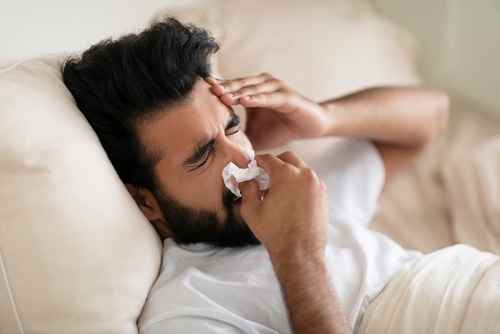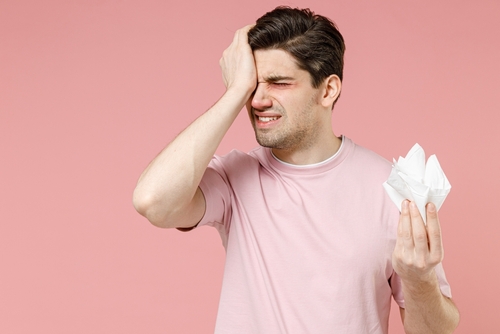
What is Allergic Rhinitis?
Allergic Rhinitis also known as hay fever is a common allergic condition found in people with low immunity. Allergic Rhinitis is an allergic reaction to pollen and dust. It is classified into two types based on the period of occurrence. They can be cyclically occurring during seasonal changes or persistent throughout the year. Environmental factors play a role in the development of allergic rhinitis and the common allergens include dust mites, plant pollens and pets.
When a person is exposed to any of the allergens or dust, the inner lining of the nostrils obstructs the foreign particles from entering the system. A sticky mucus is produced inside the nostrils that prevents the entry of the allergens. In a person with low immunity, this obstruction may not occur and the small particles in the air may enter the nasal passage causing irritation and inflammation. Ayurveda is widely regarded as the best solution for finding relief from the discomforting symptoms of Allergic Rhinitis. Ayurvedic treatment for Allergic Rhinitis incorporates herbal medicines, diet, and lifestyle changes, yielding positive outcomes.

Discover the Power of Ayurveda in Treating Allergic Rhinitis
Allergies are referred to as Pratishyaya in Ayurveda. Indigestion, sleeping during the day, being exposed to the cold, wind, and dust, participating in more water activities, staying up late at night, and following incorrect seasonal routines are a few of the factors that contribute to Dosha vitiation. Doshas are vitiated as a result of all these factors, and undigested toxins (ama) accumulate in different tissues, obstructing the channels, and resulting in allergic rhinitis. Enhancing the body's immunity is the primary goal of treatment. Effective Ayurvedic Treatment for Allergic Rhinitis in Kerala include the use of Shamana therapies (internal medications) and Shodhana therapies (cleaning remedies). When followed as prescribed, ayurvedic medicine not only aids in the recovery of the illness but also aids in its prevention. Internal medicine boosts immunity, helps the body get rid of pollutants, supports the upper and lower respiratory tract, and enhances overall health.
Contact us to get the best Ayurvedic Treatment for Allergic Rhinitis in Kerala
According to Ayurveda, the presence of accumulated toxins in the body is the main cause of allergic rhinitis. Accumulation of toxins can occur from poor digestion and low immunity which in turn aggravates the levels of Kapha in the body and increases the risk of developing an allergy to various factors.
At Ayur Bethaniya Ayurveda Hospital, we believe in balancing the three doshas in the body and improving the immunity power of the patient. The treatment plan is customised and involves clearing the sinuses through Nasya treatment and Vamana Panchakarma procedures to alleviate the relevant dosha and detoxify the body. Ayurvedic decoctions are administered to improve the digestion process, along with dietary and lifestyle alterations to strengthen the immune system. All ayurvedic medications are made using organic herbal formulations for excellent results. The patients are also advised to follow specific diet plans for long-lasting results. The diet plans include avoiding fried and spicy food, and fermented food items and limitation of tea and coffee consumption. All ayurvedic medications are directed to improve the immunity and the respiratory system in the body. Engaging in low levels of physical activity or yoga asanas helps improve the breathing process and completely rejuvenates the body and mind.
At Ayur Bethaniya Ayurveda Hospital, we provide safe and effective Ayurvedic herbal formulas and treatment plans that are customised as per individual patient conditions to treat and recover from severe allergic conditions without any side effects. To know more about allergic rhinitis ayurvedic treatment in Kerala plans and treatment costs, book an appointment now.
Feel free to contact us for your queries regarding Ayurvedic treatment for Allergic Rhinitis in Kerala.


